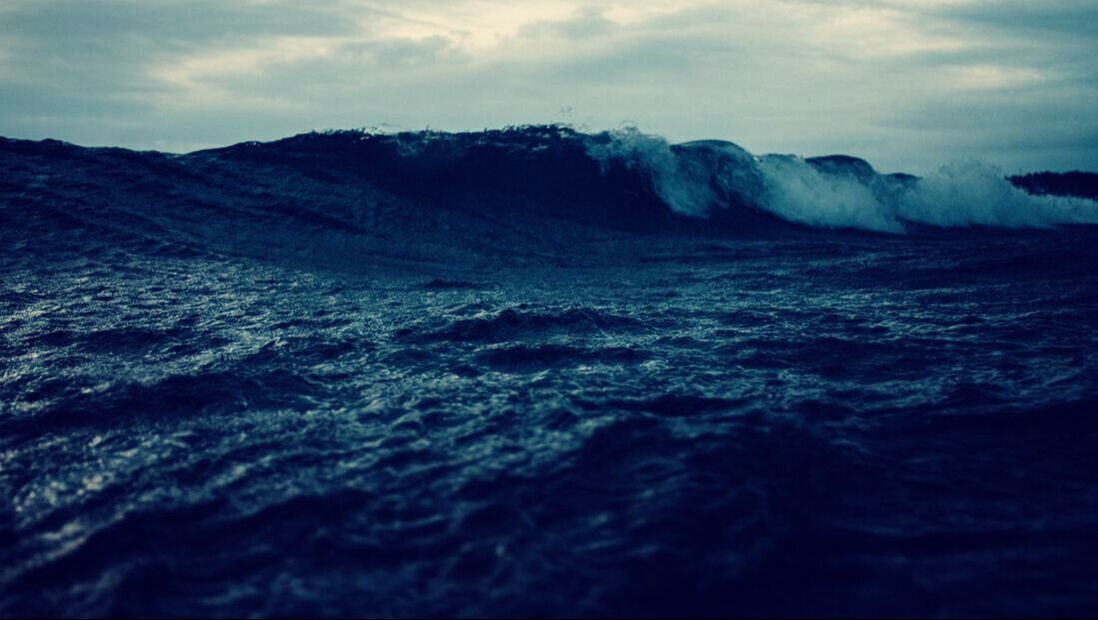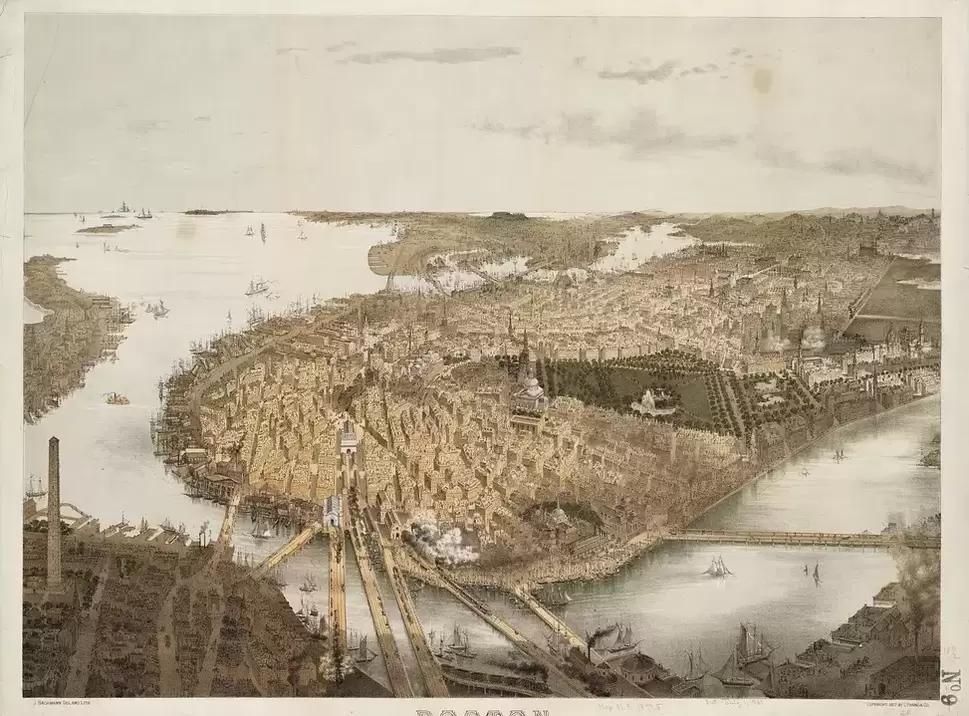|
The howling grew distant. Elizabeth had only narrowly escaped. An abandoned rail handcar had saved her from a wolf chasing her through the land of nothing, the land of desert, of the Western frontier. She gasped, hoping, holding on to the rattling car for life. Somehow she’d known how to release the brakes, and the steep downhill tracks meant that she didn't need another person across from her to pump the handcar like a seesaw. The breakneck downhill speed seemed to have outpaced her predator, and she felt a safety ahead. A safety, if unknown. She had a cautious moment to regroup, the bolts shooting down her spine easing up. This was her dream. She had set out to conquer the West, against all female odds, against the judgment of everybody back home who had told her to stay small. And then she heard it. A faint howl, contorted by the distance she’d worked so hard to put in between her and her predator. She didn't dare to look back but stiffened when she saw the slope level out not even 200 feet ahead. The handcar rattled, then creaked to a halt. Her one advantage, the fast pace gravity provided, now at an end. The howling drew close. With sweaty hands slipping, she tried to pump the handle, fighting to put the car back into motion, in vain. Maybe she was just the powerless, measly female that they all talked about. Amid the pounding of her heart, she didn't notice the howling give way to an eerie silence. Just ahead of her, a person. A man not powerless, a man. Could she accept a man's help when all she stood for was her independence? Which was worse, man or wolf? She yelled, screamed for help, her tears and frightened bearing enough to gain attention. Was this real? A reflection of the heated desert floor? A ruse of nature, a supernatural ruse? The man jumped on, opposite of her, and pumped the handle. The fight or flight response prompted a unison having developed a tad too instantly. Elizabeth too trusting, too engrossed in maneuvering the escape to have her senses at hand. They were pumping, pulling, pushing, on and forth, into the unknown, into safety. A safety too alluring to deny. Elizabeth only looked up when she realized the howling had vanished. She studied her rescuer as they wordlessly worked together. And then she saw it. His sly eyes locking hers as they morphed into the shape of blood-orange almonds. His facial hair multiplying, sprouting from his pores. “You have lovely skin. I can’t wait to wear it,” he whispered. The bones in his hands cracked, shifting and transforming. He used them to muffle her screams as she realized that the man was the wolf and the wolf the man. Her last breaths gurgling through her dying lungs, she watched him trot away. Back towards his wild frontier intact, peacefully howling the song of death. Mona Angéline is an unapologetically vulnerable new writer, artist, athlete, scientist. She honors the creatively unconventional, the authentically "other". She shares her emotions because the world tends to hide theirs. Her work was accepted in Flash Fiction Magazine, Grand Dame Literary, Down in the Dirt, Viridian Door, The Machine!, and Academy of Mind and Heart. She's a regular guest editor for scientific journals. Learn about her musings at creativerunnings.com. Drowning Drowning in self pity Drowning in guilt Drowning in the workload Unmatched socks, piles of paper and unfinished projects. Drowning in my own unhealthy body. Drowning in “what-ifs” Drowning in listlessness I think they call it ennui Drowning in a lack of desire To do anything But drown myself In another. And another. And another. If you maintain this lifestyle you won’t reach 30. – Marillion, Torch Song Kim Hurley has been writing since she learned how to hold a pen. By day, she’s a professional copywriter at a global non-profit – think, Sally Struthers – using her storytelling abilities to extract financial support for children around the world. By night, she drinks wine and pounds away at her Mac, freelancing to make ends meet. This week I went fishing for a sea monster. I go every Friday. The one I want has scales hard as silence And moonlit eyes that see straight through you, As if to say ‘I could do better’ To be fair, he could. I’ve caught him twice before. The first time he got away, Diving so deep, I could hardly see his outline As he sped away. The second time I let him think he got away But I used a line so long It went to the bottom of the ocean. So I just have to be patient. I bought more than a few good books. Right now he’s somewhere near Greenland, Annoying the icebergs. He'll be back. People say I’m crazy. That I could be doing better things With all my time and all my line. That the flat and ceaseless ocean is no companion And I should find someone to dance with. I say they’ve never met my dragon. And if they ever had the chance, To gamble all their heart On some reckless, wild chase, Then I hope they jump at it. Even the shadow of a sea serpent Can outshine the sun. The writing of Holly Payne-Strange has been lauded by USA Today, LA weekly and The New York Times. Her poetry has been published by various groups including Door Is A Jar magazine, Quail Bell, In Parenthesis, and Dipity Lit Magazine, among others. After he died, she had no interest in taking care of her husband’s prized garden. The neighbors would always comment on the enviable beauty of the grounds, perfected by many years of his obsessive and careful tending. But she hated yard work in the hot sun, disliked mosquitos and the scent of insect repellent. The smell of sweat and potting soil on her husband made her sick. And most of all, she detested the fact that work in the yard is never done. Each season has its own set of critical tasks. There are always sticks to pick up, leaves to rake, grass to mow, weeds to pull, watering, fertilizing and spraying pesticides. Year round, her husband spent most of his free time out there. So, you might wonder why she is working in the yard today. The neighbors certainly do, as they look through their windows. They are horrified when she rips out all the foliage from the garden and throws it in the street. They watch her place pavers in patterns for a winding walkway and pour bags of colored gravel between the arcs of stones. The neighbors observe with dismay as she places large pots of artificial plants on the gravel along the garden path. They hesitate to ask her about it, but sense that something is terribly wrong. Something more than a simple dislike of gardening. William Ogden Haynes is a poet and author of short fiction from Alabama who was born in Michigan. He has published ten collections of poetry and one book of short stories all available on Amazon.com. Over two hundred and thirty of his poems and short stories have appeared in literary journals and his work is frequently anthologized. http://www.williamogdenhaynes.com. "Happy birthday, Barbara," my favorite nurse, Ebony, calls to me as she snaps on the light and enters my room. I am propped on an angle in my hospital bed, which helps me breathe and sleep. I used to love birthdays. Now, they bore me. We celebrate someone's birthday or some other holiday almost every day here at Alpenglow. I guess today is my turn. I know the staff means well, and I always put on a happy face. But the truth is, I’d rather be with God. I am 95 years old. I can barely speak or move. I am either in constant pain or napping from the drugs they give me. I know it's not Christian to ask, but inside, I wonder: What did I do to deserve this? “We have a party planned for you” she changes my diaper and props me in my chair. I have changed many diapers in my life. First for my children, then my grandmother, and later, my grandkids and my mom. But I always hoped I would not suffer this indignity. It’s so hard—being treated like a baby but understanding everything. People wish you a long and happy life. A little shorter would have been okay by me. Each night, I pray I die peacefully and as soon as possible. She reaches into my closet and offers two freshly laundered cotton sweatsuits. “Green or blue?” Ebony asks. She is attentive and kind, not like Nurse Sharon. Sharon texts all day, and she passes gas right in front of me. So rude! I try to reply to Ebony’s question. My answer sounds like “Arrgh grrr.” "Green? Okay. Let's go with green to bring out your eyes," she decides. Ebony dresses me. She tenderly brushes my white hair and clips a sparkly butterfly barrette above my temple. I would never choose to wear such a childish thing. “Your family is coming with cake and presents,” Ebony’s voice is rich and honeyed. I must have dozed off for a bit after breakfast. My daughter Clem and her son Brian await as Ebony wheels me to the great room. “Here she is,” my daughter says. I feel foggy from the drugs. There are balloons. I express delight as best I can. It sounds like “Yaaarg.” My grandson Brian is handsome and clean-shaven. He wears a long-sleeved shirt to cover his arm tattoo. I don’t mind tats, but he somehow thinks I do. He also thinks he has hidden his from me all along. I allow him his secrets. I have mine, too. “Hi Bo-Bo!” he says. “Happy birthday, Mom!” My daughter's mouth is smiling, but her eyes are so sad. I know seeing me this way is taking a toll on her. I eye the cake box. They brought an expensive cake from Beth’s Bakery. It’s a dense chocolate cake with a fluffy buttercream. Chocolate is my favorite. They will put a little frosting in my mouth. I have dysphagia, so I eat baby food. The euphemism for the slop is “puree.” Who would ever choose to consume cake puree? It’s better than salmon puree, I can say that much. I take the energy I was going to use for self-pity and I try to divert it. I often pray for young people who have suffered all their lives. Never knowing what it feels like to run barefoot across the lawn on a summer day. Or to even have a private moment to dress and undress unassisted. I must have dozed off. I startle awake, my grandson clasping my hand while my daughter sings. The staff joins in. They bring me the cake, it has many candles, but they cannot light them—fire hazard. “Make a wish” Brian’s eyes sparkle. I see so much love there. But my wishes have been ignored. When I was first diagnosed, I wanted to go to Vermont or Oregon. I asked for death with dignity. The priest said I could not do that. My daughters sobbed at the mention. So, I smile and make a wish. My wish is the same as my prayer. I wish for an easy death—and soon. Sarah Gauthier Galluzzo is a freelance writer and recovering Catholic who lives in Connecticut and travels the world. Massachusetts Bay had God. The Chesapeake had tobacco. That was what John Boyse, the old gentlecove at the Dublin docks, had told him, and so the boy Garret had waited for a ship bound for the more southern colony. Then, when the younger lads had made for the Dove, the ship they said would take the poor and starving Irish boys to the eastern shore of Virginia, Boyse had bought Garret a lunch of greasy cod and warned him against rash action. The shore was the briny backwater of the Virginia Colony, Boyse had said, a strip of land that separated the great Chesapeake Bay from the vast yawn of the Atlantic, with acres and acres of tobacco fields cut up by mosquito-infested swamps. It was choked with English ambition and dangerous savages and was certainly no place for a boy like Garret, who seemed a good lad. “All the same, I think I’ll go to Virginia,” Garret had said, as he licked the grease from his fingers. He hadn’t much use for God, anyway. The old man had smiled into his handkerchief. “You’ll want an indenture, then,” he had said to Garret. Young boys, being smaller, were worth less to a Virginia planter, and so they would work the fields until the age of twenty four, when they might finally be of value. But Garret was seventeen, wasn’t he, and large for his age? A four-year indenture was what he could get, with Boyse’s help, and by the time he reached his majority, he’d be a landowner. Garret’s own Da had no land of his own. Were Garret to have stayed in Ireland, he would have spent his lifetime tilling an Englishman’s soil. What was only four years more of the same? At the end of his indenture, Boyse had said, Garret would receive a sturdy suit of clothes, a 25 pound bag of corn, a milking cow, and fifty acres of land. Boyse had found a quill, and with an unsteady hand, Garret had traded four years’ labor to put Ireland behind him. “Keep this safe,” Boyse had said, handing Garret one paper, and pocketing one for himself. “Without this, the captain might sell you as a seven-year indenture.” Captains were not to be trusted any more than any Virginian, who was as like to cheat a man as to look at him. Garret had been pleased to have found a friend. So it was a month later that Garret Sipple, once of County Wicklow, and the only Irish boy with an indenture aboard the Dove, found himself to be not only hungry, but thirsty as well. When he had first boarded the ship, the provisions were plentiful—to him, at least—and he had eaten with relish, only to find he ejected his food over the ship’s rail after nearly every meal. By the time his stomach had settled and he adjusted to the ceaseless rocking of the ship, the provisions had dwindled, and the bosun had begun to more carefully ration the rancid salt beef and stale biscuits. By the sixth week at sea—having spent nearly ten days in windless waters—the stores of drinking water had run dangerously low. Hunger was loathsome but familiar to Garret, and if he had only been hungry, he might have borne it. But the thirst in his throat, he told his young shipmates, was like to drive him mad. Garret soon began to see that the fresh water was ladled out according to rank. It was far scarcer for the boys and the men with indentures, while those with money—those big men who had bought their passage with true coin, and who had fine clothes on their fleshy bodies and in their endless stacks of wooden trunks—well, those men had water and even small beer to drink. Their faces were rosy and full, and their eyes as bright as their coins. Garret, and those like him, those poor villagers from Kildare and Meath, they grew thin and wan, their skin dried and their eyes sunk in their faces and their piss turned dark. The boy was closer to death than to land. He knew he must find more fresh water, and soon. The rain barrels were empty. He might have stolen a cask, but the bosun, wise to the sullen looks of the new servants, had locked the casks in the hold and slept with the key ’round his neck. One hot, lifeless day, Garret liberated an empty wineskin from a drunkard, and placed it in the small hands of Paddy, the youngest of the lads, pushing him toward the ladder. “Play the almsman, Paddy,” he said. ‘Beg us a bowl of beer.” He tried to spit-shine the boy’s face but found his mouth too dry. He hoisted the small boy up. Paddy scrambled onto the deck and peered back down into the dark. Then he was gone. But it was only a matter of minutes before he was back, hang-dogged and empty-handed. Garret pushed past him and climbed aloft. There he spied the captain, Pitts, playing at dice with three other men. An open cask of beer sat between them, into which they dipped their cups with astonishing frequency. Garret’s lip curled. He nearly tripped over some rigging as he made his way across the deck. “Captain, sir,” he said through cracked lips. The Captain paid him no mind. He tried again. “If you please, sir.” His face was nearly as red as his matted hair. Captain Pitts snatched the pair of dice off the crate with one hand. He did not look at Garret, but instead looked to the man at the ship’s wheel. “Mr. White,” he called, and the man at the wheel answered, but did not leave his post. “Aye?” “White, there is no wind. Permission to leave your post.” The sailor deftly crossed the deck and stood between Garret and the Captain. “Aye, Captain,” he said. “White, to your knowledge, does Bosun Tille continue to dole out the proper rations to the passengers and the company of this vessel?” The sailor scratched at his beard and looked at the Captain queerly. “Well?” “Aye,” White said slowly, “though those what works more and those what pays more are them what drinks more.” The Captain waved him aside, and looked at Garret, who stood barefoot upon the deck in his torn breeches. “There you have it, my young rogue,” he said. “The bosun allots you and your kind your proper portions.” “But those who—” “Those who work and those who pay have their fill,” he said, and shook the dice in his fist. “You are not a sailor. You are not a gentleman. Had you coin, or anything of value to any man on this ship, you could procure yourself an extra pot.” He cast the dice upon the crate. The other men leaned in to observe the outcome. Pitts looked one last time at Garret. “Have you anything of value?” Garret, angry, shoved his fists into his pockets. The right pocket had been torn through for several weeks, as he had no one on ship willing to mend it for him. His right hand felt empty air between his leg and the crusted cloth. His left hand, though, touched the smooth, folded paper that had been his constant companion since the day before he boarded the ship. His indenture, written in Boyse’s smooth hand, and signed with Garret’s crude mark in the shape of a coin. Free passage and board in exchange for four years’ labor in the fields of Virginia. This piece of paper pledged his labor to the bearer. He knew as much, even though he could not read the words. He also knew it promised him 50 acres upon the completion of his four years in the fields. Corn. A suit of clothes. Perhaps even a cow. It was the promise of riches due to him. And what was a coin—or better, a promissory banknote—but a promise of riches due to the bearer? Was this not just as good? He had never owned or held a bank note in his life, but he knew enough to know how it worked. Would he trade his future riches in the New World for a pot of beer? For the chance to share a cask with the boys below? He closed his eyes to think on it, and nearly toppled over. If he didn’t sate his thirst now, he wouldn’t make it to Virginia. He grasped the folded paper and yanked it from his pocket, thrusting it at the Captain. “This here’s worth 50 acres,” he said, his dull eyes beginning to look feverish. “And corn and clothes. And a cow.” Was the cow guaranteed? He was no longer sure. He continued to hold the crumpled paper before the captain, who remained sitting. One of the other men snorted. Captain Pitts peered at the paper. “Is that your indenture?” he asked. His brow rose. Another man slapped his knee and threw back his head in laughter. Garret looked confused, and his cheeks burned. “Aye,” he said, quickly stuffing the paper back in his one good pocket. “My money’s as good as yours.” “Aye,” the laughing man said, “but it’s not money, is it? It’s a note that says you owe the Captain for your passage. You’re a borrower, lad, not a lender.” Another of the men looked at him curiously. “Are you daft, son? You know you cannot buy goods with a note that says you owe another man.” He shielded his eyes from the sun. The heat in Garret’s cheeks was too much to bear. He was hot, and thirsty, and desperate. He began to mumble. “Decked out, burnt-arsed sons of whores…” When the captain turned, Garret lashed out with his right hand, aiming to land a blow upon the man’s gob, but he lost his balance and stumbled forward. The first mate was a bolt of lightning. He grabbed Garret’s arm and flung him to the deck upon his back, and in an instant had his boot upon the boy’s throat. He leaned down. “You have nothing of value,” he growled, “and whether or not you give away that paper, you owe four years’ labor in Virginia. You made your mark.” Captain Pitts waved his hand at White, who lifted his foot as Garret’s hands flew to his neck, and he gasped. The other men laughed and resumed their game. Ambrose White offered Garret his hand and pulled the lad to his feet. Garret stumbled to the rail. The men ignored him. His throat was both dry and bruised, and his mouth had a bitter taste. He had thought himself lucky to have had a four-year indenture. What a fool he was! To think the paper he carried safe in his pocket the entire passage had been worth not even a sip of small beer. He pulled it from his pocket and angrily tore it to little pieces, flinging them over the rail, and watched as they fluttered straight down to the still water and stuck to the unmoving surface. Worthless. Molly Moran has a bachelor’s in English Literature from the Catholic University of America, an MA in Communication, Culture, and Technology from Georgetown University, and is currently pursuing an MFA in Creative Writing from Miami University of Ohio, where she teaches digital design. In 2003, she published her first short story in Crux Literary Magazine. She is returning to writing after a 20-year career designing award-winning technologies for the U.S. Foreign Service and four Secretaries of State. |
Follow Us On Social MediaArchives
June 2024
Categories
All
Help support our literary journal...help us to support our writers.
|
Home Journal (Read More)
Copyright © 2021-2023 by The Whisky Blot & Shane Huey, LLC. All rights reserved.






 RSS Feed
RSS Feed